Although the Central and state governments continue to believe that it can remain education as usual, a new generation of edtech innovators are developing new digital technologies to enable a break away from traditional learning systems in the country’s pre-primary, primary-secondary and higher education institutions – Dilip Thakore
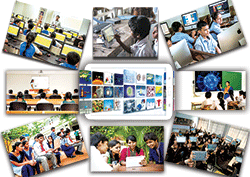 A Silent revolution is underway in India’s classrooms. Although the Central and state governments pay lip service to the infusion of real learning and knowledge creation in school and higher education, reports of reputable, whistle-blowing organisations such as the Mumbai-based Pratham, Delhi-based Aspiring Minds and even the Union human resource development (HRD) ministry’s National Achievement Survey (see EW June 2016), testify that learning outcomes are plunging in K-12 and tertiary education. But the silver lining is that a substantial number of India’s private schools and colleges, which host over 50 percent of the 260 million children and youth in education institutions countrywide, are embracing new digital and Internet-enabled technologies which are reviving children’s joy of learning and making measurable impact on learning outcomes.
A Silent revolution is underway in India’s classrooms. Although the Central and state governments pay lip service to the infusion of real learning and knowledge creation in school and higher education, reports of reputable, whistle-blowing organisations such as the Mumbai-based Pratham, Delhi-based Aspiring Minds and even the Union human resource development (HRD) ministry’s National Achievement Survey (see EW June 2016), testify that learning outcomes are plunging in K-12 and tertiary education. But the silver lining is that a substantial number of India’s private schools and colleges, which host over 50 percent of the 260 million children and youth in education institutions countrywide, are embracing new digital and Internet-enabled technologies which are reviving children’s joy of learning and making measurable impact on learning outcomes.
While the country’s 1.34 million anganwadis — nutrition centres for newly-born children and lactating mothers established nationwide under the Central government’s Integrated Child Development Services (ICDS) programme promoted in 1975 — are also mandated to provide early childhood education to 164 million children under five years age, they accommodate only 84 million, because the pathetic annual budget of the ICDS programme (Rs.14,863 crore in 2016-17) barely covers the low salaries paid to staff. On the other hand, a large and growing number of the country’s estimated 300,000 pre-primaries which host 10 million youngest children of middle and upper class households, are rapidly transforming them into digital natives through smartboards, videos, tablets and gamification of early childhood care and education.
Likewise, the majority of the nations 320,000 private and aided primary-secondary schools are leveraging modern digital technologies and pedagogies, prompting an overdue break away from conventional rote learning and encouraging children to become self-motivated and joyfully develop conceptual learning, analytical and problem-solving skills. And in India’s colleges and universities suffering excessive government interference and chronic funds and faculty shortages, a small minority of serious students and faculty is increasingly using new ICT (information communication technologies) and Moocs (massive open online courses) offered by the world’s most respected universities including Harvard, MIT and Stanford among others, to learn from globally respected professors.
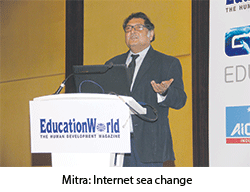 Dr. Sugata Mitra, professor of educational technology at Newcastle University, UK and author of the ‘hole-in-the-wall’ computer experiment (1999) in New Delhi which prompted him to develop SOLE (self-organised learning environments) which marries the self and peer-to-peer learning capabilities of children with digital technology, believes that with the invention of the Internet, the value premises and grammar of education have changed. “Technology has always been important for education when used correctly. This has been so since the blackboard was invented, followed by paper, writing, printing and books. But in our time, its the Internet that is causing the big change. For the first time history students have instant access to the collective wisdom of humanity. This changes the meaning of ‘knowledge’. Today it is possible to learn anything at the point in time when that knowledge is required. This has never happened before. This means we don’t need the ‘just in case type of education where children are taught all sorts of things for 12 years or more, just in case they ever need that information or knowledge. Instead, we have access to ‘just in time’ education — the ability to learn something quickly and accurately when we need to”, says Mitra explaining the sea-change in the very character and utility of education.
Dr. Sugata Mitra, professor of educational technology at Newcastle University, UK and author of the ‘hole-in-the-wall’ computer experiment (1999) in New Delhi which prompted him to develop SOLE (self-organised learning environments) which marries the self and peer-to-peer learning capabilities of children with digital technology, believes that with the invention of the Internet, the value premises and grammar of education have changed. “Technology has always been important for education when used correctly. This has been so since the blackboard was invented, followed by paper, writing, printing and books. But in our time, its the Internet that is causing the big change. For the first time history students have instant access to the collective wisdom of humanity. This changes the meaning of ‘knowledge’. Today it is possible to learn anything at the point in time when that knowledge is required. This has never happened before. This means we don’t need the ‘just in case type of education where children are taught all sorts of things for 12 years or more, just in case they ever need that information or knowledge. Instead, we have access to ‘just in time’ education — the ability to learn something quickly and accurately when we need to”, says Mitra explaining the sea-change in the very character and utility of education.
Last May in an interview with EducationWorld, Mitra explained that “21st century learners learn differently”. “We need to factor the Internet into our schools and examinations, and set up collaborative learning spaces in schools. The Internet will change Indian education, not governments. In a few years it will no longer be possible to tell whether a person is consulting the Internet, or not. That will change the concept of ‘knowing and knowledge. India will be saved by the future of technology, not by political will”, said Mitra in that insightful interview (see https://www.educationworld.in/magazine/more/4911-21st-century-learners-learn-differently).
Unfortunately, politicians at the Centre and in the states continue to believe that it can remain education as usual in the country’s 1.20 million government schools, 37,000 colleges and 800 universities. Although from time to time they pay lip service to new technologies and announce alphabet soup acronyms for wiring up government schools and colleges, they exhibit scant interest in modernising the infrastructure and funding teacher training programmes which are prerequisites of effective use of the revolutionary digital technologies which can leapfrog India’s 19th century education system into the new millennium.
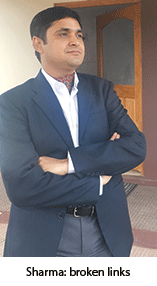 Proof of official indifference to deep-rooted education reform is provided by the pathetically inadequate budgetary provision for educating the worlds largest (480 million) child population. Despite the high-powered Kothari Commission having recommended a national (Centre plus states) annual outlay of 6 percent of GDP for education way back in 1966 — an imperative endorsed by the National Education Policy (NEP) reports of 1968, 1986 and recently by the T.S.R. Subramanian Committee constituted by the BJP/NDA government to recommend the framework of NEP 2016 — the annual outlay for public education has averaged a mere 3.5 percent of GDP for the past six decades, against the world average of 5 percent and 7-10 percent of developed OECD countries.
Proof of official indifference to deep-rooted education reform is provided by the pathetically inadequate budgetary provision for educating the worlds largest (480 million) child population. Despite the high-powered Kothari Commission having recommended a national (Centre plus states) annual outlay of 6 percent of GDP for education way back in 1966 — an imperative endorsed by the National Education Policy (NEP) reports of 1968, 1986 and recently by the T.S.R. Subramanian Committee constituted by the BJP/NDA government to recommend the framework of NEP 2016 — the annual outlay for public education has averaged a mere 3.5 percent of GDP for the past six decades, against the world average of 5 percent and 7-10 percent of developed OECD countries.
“In the 21st century, technology is becoming crucial in school and higher education. But for it to effectively improve learning outcomes, enabling learning environments are critical. Over the past decade, a large number of private sector companies have dumped hardware and content into education institutions without adequately training teachers to use them and/or properly assessing the supportive infrastructure requirements such as electricity, Internet connectivity and equipment maintenance support. Creation of supportive environments for new digital technologies necessitates larger Central and state government education budgets. The HRD ministry’s National Repository for Education Resources has made a lot of high-quality content developed by NCERT available free of charge to government schools. But because of insufficiently trained teachers and inadequate supportive infrastructure, online education is a non-starter in the great majority of government schools. These are the broken links of public education which need to be mended”, says Shailender Sharma, a computer science postgrad of IGNOU and former chief consultant of the education management infosystem of the Union HRD ministry.
Currently Sharma is vice-president of IPE Global Ltd (estb. 1998), a Delhi-based international development consultancy providing expert technical assistance to developing countries for equitable development and sustainable growth in partnership with multilateral and bilateral aid agencies, governments, corporates and not-for-profit entities.
Nevertheless despite half-hearted government support, the number of private schools which educate almost half the country’s in-school children and top-ranked private and government universities making determined efforts to employ new technologies to encourage and promote higher order thinking skills of their students, is increasing rapidly. In the country’s top 410 preschools and 1,000 primary-secondary (including government and private budget) schools rated and ranked annually by EducationWorld on 10-plus parameters of education excellence, smartboards, tablets and/or audio-visual equipment loaded with sophisticated content to supplement and explain textbook content are normative, and have dramatically improved cognitive skills and learning outcomes of middle class children.
Similarly, in India’s few hundred premier private and government colleges and universities — particularly IITs, IIMs and new genre private universities (Manipal, Amity, SRM, Shiv Nadar, Ashoka, O.P. Jindal, BML Munjal among others), more and more students are accessing Moocs (massive open online courses) of MIT-Harvard, Stanford as also the National Programme on Technology Enhanced Learning (NPTEL) developed by the seven Indian Institutes of Technology (IIT Bombay, Delhi, Guwahati, Kanpur, Kharagpur, Madras and Roorkee) and the Indian Institute of Science, Bangalore.
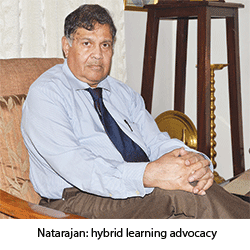 “Introducing new digital technologies in K-12 education is very important as it enables grasp of concepts and develops critical thinking and problem-solving skills of children in early age, providing a strong foundation for higher education. Fortunately, IT-enabled technologies to enhance classroom learning in school education are becoming widely available and costs are falling. However because of insufficient budgets and teacher training, the permeation of enabling technologies in school — especially government school — education is very slow. In higher education while the quality of online courses is constantly improving, dropout rates in these programmes are over 80 percent because Indian school education doesn’t instill the self-learning skills and self-discipline required to complete online study programmes. Therefore higher education institutions — and corporates — need to provide opportunities for hybrid learning which is a combination of online and classroom learning. Hybrid programmes are proving very effective in some developing countries such as Malaysia, where most higher education institutions have switched to the flipped classroom model”, says Dr. R. Natarajan, an engineering alum of Waterloo University, Canada, former director of IIT-Madras and former chairman of the All India Council for Technical Education (AICTE).
“Introducing new digital technologies in K-12 education is very important as it enables grasp of concepts and develops critical thinking and problem-solving skills of children in early age, providing a strong foundation for higher education. Fortunately, IT-enabled technologies to enhance classroom learning in school education are becoming widely available and costs are falling. However because of insufficient budgets and teacher training, the permeation of enabling technologies in school — especially government school — education is very slow. In higher education while the quality of online courses is constantly improving, dropout rates in these programmes are over 80 percent because Indian school education doesn’t instill the self-learning skills and self-discipline required to complete online study programmes. Therefore higher education institutions — and corporates — need to provide opportunities for hybrid learning which is a combination of online and classroom learning. Hybrid programmes are proving very effective in some developing countries such as Malaysia, where most higher education institutions have switched to the flipped classroom model”, says Dr. R. Natarajan, an engineering alum of Waterloo University, Canada, former director of IIT-Madras and former chairman of the All India Council for Technical Education (AICTE).
Against this backdrop of slow penetration of digital technologies in the base and middle segments of Indian education, a minority of brave and determined edupreneurs are risking time, money and resources to popularise and accelerate their usage across the education spectrum. In the pages following we present their stories and plans to raise academic standards and learning outcomes to release the full potential of the worlds largest child and youth population.
Byjus love of learning apps
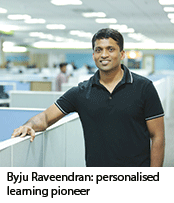 A major infirmity of Indian education is that the majority of students in primary-secondary schools and even in higher education learn to examinations. The consequence of this centuries-old tradition is that learning by rote rather than by way of conceptual clarity and thorough comprehension has become normative at all levels in Indian education. With teachers and academic communities also having become accustomed to rewarding memorisation rather than real learning of students, this tradition has adversely affected the cognitive development, knowledge application, lateral thinking and problem-solving skills of several generations of India’s children and youth.
A major infirmity of Indian education is that the majority of students in primary-secondary schools and even in higher education learn to examinations. The consequence of this centuries-old tradition is that learning by rote rather than by way of conceptual clarity and thorough comprehension has become normative at all levels in Indian education. With teachers and academic communities also having become accustomed to rewarding memorisation rather than real learning of students, this tradition has adversely affected the cognitive development, knowledge application, lateral thinking and problem-solving skills of several generations of India’s children and youth.
This explains why Indian school students fare dismally in international tests such as PISA (Programme for International Student Assessment) which evaluates the knowledge application skills of 15-year-olds, and even the Union HRD ministry’s National Achievement Survey 2015 which assessed the real learning outcomes of 277,416 class X students of 7,216 schools affiliated with CISCE, CBSE and 31 state boards countrywide (see EW, June 2016 or https://www.educationworld.in/magazine/more/4934-national-achievement-survey-2015-indias-premier-school-examinations-board).
Evidently, this situation was unacceptable to Byju Raveendran, a mechanical engineering graduate of Kannur University (Kerala) and former software professional, who began his career in 2007 by informally helping friends to prepare for the highly-competitive CAT (Common Admission Test) in which the top percentile scores determine entry into the country’s highly-prized IIMs. After Raveendran’s tutorials and workshops based on his self-devised pedagogy of intellectually stimulating students and generating “love of learning” became popular and successful, he decided to reach out to larger numbers of students.
In 2011, together with some friends, Raveendran promoted the Bangalore-based Think & Learn Pvt. Ltd, a company which utilised new ICT (information communication technologies) to make learning enjoyable for children in classes IV-XII. And in August 2015, the company launched BYJU’s — The Learning App which can be downloaded on all Internet-connected devices, including ubiquitous cell phones.
Since then, according to company spokespersons, Byju’s has established itself as the country’s largest K-12 learning app with over 7 million paid downloads and 330,000 subscriber users. But perhaps even more than educators, Byju’s learning app has generated greater excitement within the global investors community. Think & Learn Pvt. Ltd has raised $150 million (Rs.1,026 crore) from global investors including the Chan Zuckerberg Initiative, International Finance Corp, Sequoia and Sofina.
According to Raveendran, the USP of the company is that in a departure from the learning to exams tradition, Byju’s learning modules, videos and interactive programs — designed by a 500-plus research team — stimulate intellectual curiosity and cultivate genuine interest in knowledge and learning.
“Even in the 21st century, children’s learning is driven by fear of exams rather than love of learning. The prime objective of Byju’s apps is to make learning accessible, effective, engaging, personalised and self-paced for everyone. We are pioneers of personalised learning which factors in every learners proficiency and style of learning. With an average time of 40 minutes being spent by subscriber students on our learning app, it has become the most loved and preferred education app for students across all age groups. Validation of its effectiveness is the renewal rate of 90 percent year on year”, says Raveendran, adding that the company is working on expanding its operations internationally to reach students in the US, UK and other English speaking countries.
Mypedia ecosystem package
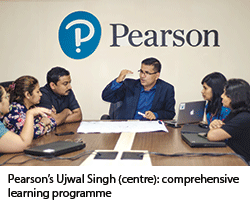 One of the major problems confronting managements of progressive schools, is to pick and choose ICT (information communication technologies) products and services being aggressively promoted by large and boutique companies and firms. Most private school promoters and principals — the prime targets of ICT hardware, content and service providers — complain that a disproportionate quantum of their time is spent listening to salespersons and assessing the relative merits of competing revolutionary ICT products, processes and content which promise to dramatically improve children’s learning outcomes.
One of the major problems confronting managements of progressive schools, is to pick and choose ICT (information communication technologies) products and services being aggressively promoted by large and boutique companies and firms. Most private school promoters and principals — the prime targets of ICT hardware, content and service providers — complain that a disproportionate quantum of their time is spent listening to salespersons and assessing the relative merits of competing revolutionary ICT products, processes and content which promise to dramatically improve children’s learning outcomes.
Ujjwal Singh, vice president (products and innovation) of the Bangalore-based Pearson Education Services Pvt. Ltd (estb.1994), a subsidiary of the UK-based Pearson PLC (gross revenue: Rs.36,960 crore in 2015), believes the solution is MyPedia, a comprehensive learning programme for classes I-VIII children which integrates textbooks, workbooks, videos, assessments plus teacher training and parental involvement. Moreover, it is designed to dramatically “develop application and higher order thinking skills that will enable learners to succeed in a very complex and challenging world 15 years from now”.
“MyPedia is more an ecosystem than a product. It brings together all stakeholders of the learning process of every student (of subscriber schools) starting from school leaders, teachers and parents with learners at centre. MyPedia engages parents through an orientation, and includes a school leadership program for school management excellence. The assessment ensures in-depth tracking of learners progress on thinking skills. The programme creates a transparent and accountable system. School leaders can feel more comfortable investing their resources and effort in this eco-system”, explains Singh.
Rolled out in 2014 as Pearson India’s flagship product and marketed as a whole school subscription programme at Rs.2,000-3,000 per student per annum, the multi-user MyPedia learning ecosystem has been enthusiastically welcomed by schools across the country, especially in under-served tier-II and tier-III towns and cities. Within two years of its launch in the Indian education market, the number of subscriber schools has multiplied ten-fold from 35 in 2014-15 to 350 currently, with over 100,000 primary and upper primary students learning joyfully and comprehensively from MyPedia. Subscriber schools include Johnson Grammar, Hyderabad, DPS, Manali, Vaels Vidyashram, Chennai, Uttam School, Ghaziabad and Timphany, Visakhapatnam.
“By integrating coursebooks, assessment reports, continuous teacher development and parental involvement into one package, the MyPedia ecosystem measures and enables whole school improvement. The programme has been developed with inputs and feedback from numerous practitioners, academics, subject-matter experts and Pearson’s own global research and thought leaders. This year we will be looking at assessment data for 200,000 learners to measure the programmes efficacy. Creating measurable learner outcomes is one of Pearson’s main focus areas, and MyPedia has been designed with this guiding principle at its core”, says Singh.
Robomate exam crackers
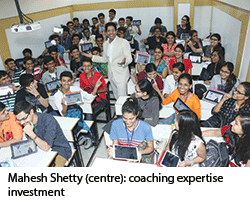 Discovery of unprecedented learning opportunities presented by new information communication technologies (ICT) in India’s huge K-12 education market comprising 1.4 million primary-secondaries, including 320,000 recognised private schools, has prompted a growing community of for-profit edupreneurs — may their tribe increase — to design ICT-enabled products and services for this under-mined, high-potential market. This development happily coincides with the rise of a post-liberalisation urban middle class of 55 million households exerting pressure on school managements to provide globally benchmarked pre-primary and school education, and willing to pay for it.
Discovery of unprecedented learning opportunities presented by new information communication technologies (ICT) in India’s huge K-12 education market comprising 1.4 million primary-secondaries, including 320,000 recognised private schools, has prompted a growing community of for-profit edupreneurs — may their tribe increase — to design ICT-enabled products and services for this under-mined, high-potential market. This development happily coincides with the rise of a post-liberalisation urban middle class of 55 million households exerting pressure on school managements to provide globally benchmarked pre-primary and school education, and willing to pay for it.
The congruence of these three developments — growth of the K-12 education market, invention of new digital education technologies and rising demand for real as against ritual education — has encouraged test prep companies hitherto focused on the highly competitive entrance exams of professional institutions, to enter the K-12 education segment. Prominent among them is the publicly listed, Mumbai-based heavyweight test prep corporate MT Educare Ltd. (estb.1988, annual revenue: Rs.227 crore) which prepares over 100,000 students annually to write school-leaving and entrance exams such as CAT, IIT-JEE, CET, AIMPT etc, in its 275 digitally connected centres countrywide.
Last June, the company launched its Robomate Plus App for students of schools affiliated with the CBSE, CISCE and Maharashtra state board. The curriculum-mapped video lectures covering a wide variety of subjects for classes VI-IX and all subjects for classes X-XII are modestly priced between Rs.1,000-4,800 and can be downloaded on PCs, tablets and (android) mobile phones for “anytime, anywhere” supplementary learning. Simultaneously, MT Educare also launched its Robomate Plus platform for high and higher secondary schools. Apart from downloadable video lectures for all subjects, the platform offers school managements the facility to add their own content, digitise prescribed textbooks, conduct assessment tests, generate anlaytics reports and connect teachers, students and parents.
“The differentiating characteristic of the Robomate Plus App is that unlike other software and content providers, we have invested 28 years of our highly successful examinations-oriented coaching expertise into easily downloadable lectures. We don’t offer general education enhancement content. Our content is written by our experienced, exam-results driven teachers. Its not entertainment or gaming. Its hard core tests and results driven”, says Mahesh Shetty, a science and education alum of Mumbai University, who began his career as a science and maths tutor in 1988 and has engineered the growth and development of MT Educare Ltd into the country’s largest test prep company.
Unsurprisingly, public response to MT Educare’s Robomate initiative has been excellent. Within six months of its launch, the company has signed up 55,000 retail student subscribers (Rs.200-800 per month) and 150 schools for its institutional services platform (Rs.100-500 per child per year).
Enthused by the positive response to its latest offering, the company has begun video-recording lectures mapped with the curriculums of the IBO (Geneva) and CIE (UK) boards. “Our Robomate Plus App and institutional platform have sparked a revolution in education by enabling students to learn in the classroom or at home, indeed anywhere, from proven experienced teachers”, says Shetty.
Univariety online career counselling
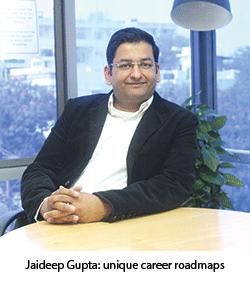 Until very recently, career counselling and guidance was a major pain point of the Indian education system. Although in top-ranked private primary-secondary schools, career guidance and counselling is serious business and trained in-house or external career counsellors discharge the critical duty of advising students about subject streaming and choosing the most suitable college/university with a long-term career path in mind, in the great majority of schools countrywide this job usually devolves upon an untrained senior teacher on the brink of retirement with vague notions of career guidance.
Until very recently, career counselling and guidance was a major pain point of the Indian education system. Although in top-ranked private primary-secondary schools, career guidance and counselling is serious business and trained in-house or external career counsellors discharge the critical duty of advising students about subject streaming and choosing the most suitable college/university with a long-term career path in mind, in the great majority of schools countrywide this job usually devolves upon an untrained senior teacher on the brink of retirement with vague notions of career guidance.
This scenario has changed radically since 2011 when Jaideep Gupta, a business management graduate of Delhi University and Narsee Monjee Institute of Management Studies, Mumbai, and former investment banker (GE Capital, Morgan Stanley and Ernst & Young (Singapore, Mumbai), promoted the Hyderabad-based International Education Gateway Pvt. Ltd (IEG). The company utilises new digital technologies to provide a slew of online career guidance and counselling services to high school students across the country.
“Although I was mainly schooled in the US where my father was a university professor, I completed my higher secondary education at Kendriya Vidyalaya, IIT-Kanpur in 1991. Twenty years later, I discovered that the amateurish career counselling process in Indian schools had not changed. This prompted me to promote IEG which embeds college guidance in schools under the brand name of Univariety. I also roped in an old college friend — Varun Aggarwal, formerly with Mckinsey & Co — to join this effort”, he says.
According to Gupta, IEG has developed online systems — under the whole school subscription model — enabling every student to log in and utilise 26 tools (options) to select colleges/universities in India and abroad according to rankings, budget, geography, climate, scholarships etc. “The Univariety online system enables every student of a subscriber school to access career knowledge and choose a higher education institution most suitable for her aptitudes and needs. It enables the creation of a unique career roadmap for every student with the school management in the loop”, explains Gupta.
During the past five years, the company’s career guidance and counselling system has been upgraded to enable a student to receive information and advice not only from faculty in colleges/universities, but also from students enrolled in targeted institutions and former students of the candidate’s school. “Our unique selling proposition is that we provide counselling from multiple sources through new technologies. This combination is being accepted by progressive CBSE, CISCE, IBO (Geneva) and CIE (UK)-affiliated schools. Of late, several Central universities such as NALSAR, IIM-Indore and Delhi University are using the system to engage with students and clarify misconceptions”, says Gupta.
Evidently the online Univariety career counselling package has impressed the principals and managements of progressive (private) schools. During the past two years in particular, the number of subscriber/partner schools IEG has signed up (Rs.1-10 lakh per annum) has accelerated to 400 countrywide. Among them: Oakridge International (Hyderabad and Bangalore), Hiranandani Foundation School (Mumbai), Sat Paul Mittal (Chandigarh) and DPS, Mathura Rd (Delhi). “After some initial hesitation, there is growing acceptance of the idea of providing career guidance when the student needs it and not when the counsellor is available. The additional attraction of online career counselling is that remotely located schools are not at a disadvantage. Therefore schools in tier II-IV cities and towns are enthused to sign up with us”, says Gupta.
With Indian students fleeing abroad in increasing numbers despite rising tuition fees in foreign higher education institutions, the company is also signing up with universities in the US, UK and Canada as institutional partners (Rs.25,000-5 lakh) and offering Univariety services to schools in the Middle East (it takes less than a week to wire up each school). Moreover, to enable subscriber schools to become self reliant, Univariety has partnered with the top-ranked University UCLA (Extension) to train selected teachers to become professional career counsellors.
| Company /brand | Established | Products/services |
|---|---|---|
| Educomp Solutions Ltd | 1994 | Digital content solutions for the K12 segment. Educomp Smartclass is its flagship teacher-led solution. Also partners with 14 state governments to offer computer labs, multimedia content in regional languages, testing and certification in computer education, and teacher training. |
| Vedantu Innovation Pvt. Ltd | 2011 | Online education platform, providing tech-based education to enable personalised learning. The company has created in-house products optimised for low bandwidth conditions. |
| U Education Management Pvt. Ltd | 2015 | The company provides content, technology and services with courseware sourced from academia and industry. Courses are co-branded in partnership with universities whose faculty design the curriculum. |
| Fliplearn Education Pvt. Ltd | 2015 | A personalised online learning and sharing platform which collects learning indicators of students to create personalised learning pathways from thousands of curated learning resources. 2.3 million registered users. |
| Toppr | 2013 | An online subject-learning platform enabling students to prepare for IIT-JEE, AIPMT, and school board exams in India. Students can take unlimited tests, get feedback reports and compare rankings on mobile Toppr app. |
| Testbook | 2013 | Exams preparation platform providing mock tests for GATE, SBI Bank PO, SBI Clerk, IBPS PO and IBPS Clerk exams. |
| Plancess EduSolutions Pvt Ltd | 2012 | The company enables IIT-JEE aspirants and delivers material prepared by experts in the form of online video lectures. |
| Embibe | 2012 | An online test prep portal specialising in engineering entrance and medical exams. |
| iProf Learning Solutions India Pvt. Ltd | 2009 | PC-based education content delivery company, enables students to learn and revise concepts for classes X to XII and tests including IIT-JEE, AIPMT, CA-CPT among others. |
| Meritnation | 2009 | Offers live classes, animated videos, interactive exercises, practice problems, tests material and content aligned to major exam boards including CBSE, ICSE and state boards, to over 8.2 million K-12 students. |
| SimpliLearn | 2009 | Provides professionals with certification training courses. |
| CultureAlley | 2012 | It offers self-paced audiovisual lessons and interactive practices. User can master conversations, phrases, vocabulary, pronunciation while browsing the web. |
| Earth Education Valley Pvt. Ltd (EduKart) | 2011 | Offers 2000+ degree, diploma, certificate, entrance coaching & K-12 courses. Online, distance and correspondence courses. |
| Nayi Disha | 2012 | Engaging learning modules for preschoolers. |
| authorGEN Technologies/WizIQ | 2007 | WizIQ delivers high impact online teaching and training through its online platform and mobile apps and makes virtual classrooms possible. |
| ConveGenius Edu Solutions Pvt. Ltd | 2013 | Convegenius is a mobile first product company focused on digitising India education and making it affordable, fun and rewarding. |
| Imarticus Learning Pvt. Ltd | 2012 | Offers a comprehensive range of professional financial services and analytics programs. |
| FlipClass | 2013 | Home tutoring service providing high quality teachers at your door step. |
| Cuemath | 2013 | Cuemath offers a technology platform for women to run home-based learning centres for young students from LKG to class VIII. It claims to have the fastest growing network of math learning centres in India. |
| Avagmah | 2010 | Helps universities, institutions and distance education providers make higher education more inclusive by reaching out to broader audiences. |
| Liqvid eLearning Services Pvt. Ltd | 2002 | A custom e-learning content and solutions provider specialising in blended learning, instructional design and enterprise learning management systems. |
| SP Robotic Works Pvt. Ltd | 2012 | Online robotics shop, workshops and internships are the various platforms for college students to improve their practical knowledge and develop interest in robotics. |
| Mindler | 2015 | Online career guidance platform to help students find best-fit careers. |
| Entab Infotech Pvt. Ltd | 2001 | ERP solutions to schools and educators with facility to digitise content. |
| Vidyartha | 2012 | Personalised learning guidance for classes VIII-XII. |
| MICM Net Solutions | 2002 | Offers ERP, LMS and mobile applications for K-12 schools. |
| Phyzok | 2011 | Flipped classrooms for schools — end-to-end content production, delivery, technology and training. |
| Educational Initiatives | 2001 | Research and technology-based education solutions for K-12 students. |
| First In Math | 1988 | An awards winning, online maths programme for K-VIII students providing neurological deliberate practice required for maths achievement. |
| Tata ClassEdge | 2011 | Technology solution provider for schools. Provides content to enhance learning experiences of teachers and students. |
| Teno app | 2016 | Free to use mobile application that facilitates communication between school, teachers and parents/students. 300,000 parents, 1,200 schools, 2,600 teachers in 250 cities use the Teno app. |
| Com-Sur | 2001 | CCTV video auditing, smart back-up and incident reporting system ensuring safety surveillance in schools.
Source: Edtechreview.in & EW Research |























